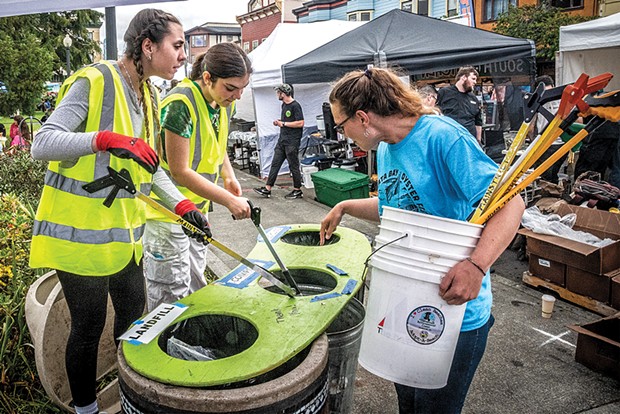[
{
"name": "Top Stories Video Pair",
"insertPoint": "7",
"component": "17087298",
"parentWrapperClass": "fdn-ads-inline-content-block",
"requiredCountToDisplay": "1"
}
]
If each of the more than 12,000 people in attendance at Arcata Bay Oyster Festival restrained themselves to only two orders of grilled Pacifics served with disposable forks, 24,000 sets of plastic prongs would likely make their way to landfill. Events of such a scale not only create a lively community, but also literal tons of waste. Even bioplastics made of natural materials designed to decompose don't always break down quickly enough, leading to challenges when composters turn their waste into soil.
To help reduce the amount of garbage at this year's festival, the Arcata Chamber of Commerce and Bright and Green — a local business encouraging sustainable dishware for events — have joined forces. Organizers are banning all types of single-use plastics, including bioplastics, ensuring all cups and dishes at the 2024 Oyster Festival are locally compostable.
"Events can be one of the biggest waste drivers for our community and we want to have a good reputation with keeping everything clean," Gloria Baker, operations and events manager for Arcata Chamber of Commerce, said. "I think [banning all plastics] is important because it kind of puts us in a position, being one of the largest events in Arcata, to influence others to do the same thing."
Leading up to the decision to ban bioplastics, Bright and Green Director Carly Tambling researched options for composting bioplastics locally. She discovered that because they didn't decompose as quickly or thoroughly as advertised, some of them had to be sorted out and sent to the landfill, and only certain types of bioplastics could be composted.
That said, Lloyd and Stacey Barker from Local Worm Guy, the team responsible for handling Oyster Festival waste, believe using bioplastics is still much better than relying on regular plastics. "As much as [bioplastics] cause us some difficulties in a production sense, I think in a global sense they are a much better alternative to regular plastics. I don't want them to be too vilified because, realistically, if we are going to use plastic, bioplastic is a much better alternative," Lloyd Barker said. He says while it's not a perfect solution, it's not without some promise.
He estimates that roughly 90 percent of bioplastic bags decompose, whereas only around 10 percent of bioplastic cutlery breaks down in a reasonable amount of time for his composting system. Even though bioplastics are designed to decompose alongside food and plant waste, there is significant variation in their effectiveness.
When available, Lloyd Barker encourages plant and bamboo products and reusable alternatives.
Bright and Green's approach to sustainability at the festival is multi-faceted. The company will sell and promote reusable dishware at the event, but also work with vendors to build a comprehensive guide to compostable products. "For the waste reduction management, we work really, really closely with the vendors in order to manage waste and reduce it," Tambling said, adding that work begins "months and months" before the event.
Instead of sipping from single-use plastics, festival-goers must bring their own cups, or buy stainless steel or hard plastic cups on the plaza from Bright and Green. "We weren't prepared to go with reusable everything this year, but we did make a huge step in banning bioplastics so all cups are reusable," Tambling said. And those 24,000 forks won't pile up in a landfill.
Combined, these efforts substantially impact waste reduction. Local Worm Guy processed a massive amount of compost at last year's Oyster Festival and may see even more this year. "Last year, Local Worm Guy took home 10 cubic yards of compost," Tambling said. "That's all waste diverted [from landfills]. That's adding extra value to the community."
Oyster Fest isn't the only local event reducing waste this year. Bright and Green provides a reusable exchange program for dishware at many smaller events. "Right now, we're doing a pilot program with the farmers market," Tambling said. "[At] the farmers market, a lot of the vendors have reusable cups and cutlery and right next to the trash cans we have a place where you can drop them off." Customers can take the green-colored dishware from vendors and replace it when done with their meal. If everything goes as planned, a similar system could be implemented at larger festivals in the future.
The community can help reduce waste at the Oyster Fest, too. If you volunteer as a Trash Talker, you can help guide festival-goers in sorting their waste into the correct bins, reducing the workload of dividing compost, recycling and trash later. Sign up to be a Trash Talker at m.signupgenius.com/#!/showSignUp/10C0B49AFAF28A2FACE9-48293090-zero. Volunteers will receive two drink tickets and a meal ticket.
Sasha love (she/her) is a feature editor for the Arcata High Pepperbox and a freelance writer for local publications.
Speaking of...
-

A Second Amateur Win at Oyster Fest
Jun 15, 2023 -

Photos: Oyster Fest's Return to the Plaza
Jun 14, 2023 -

Indigenous Boats, Fish Stories and Oyster Fest Plans
Jun 9, 2023 - More »
Comments
Showing 1-1 of 1
































